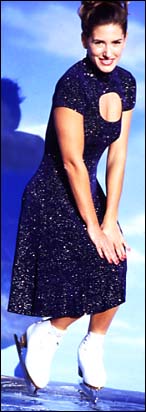A normal life
 Tonia Kwiatkowski finished second at the U.S. Figure Skating Championships in San Jose, Calif. in mid-January. Now, she's getting ready for the World Championships in Edmonton, Alberta, March 17-24. As she prepares for the worlds, the 24-year-old fondly known as the "Grand Old Lady" of the U.S. amateur skating scene will contribute an exclusive weekly diary to ESPNET SportsZone.
Tonia Kwiatkowski finished second at the U.S. Figure Skating Championships in San Jose, Calif. in mid-January. Now, she's getting ready for the World Championships in Edmonton, Alberta, March 17-24. As she prepares for the worlds, the 24-year-old fondly known as the "Grand Old Lady" of the U.S. amateur skating scene will contribute an exclusive weekly diary to ESPNET SportsZone.This week, Tonia describes the life of a skater outside the rink. She grew up dedicated to her sport, but managed to keep the rest of her life on an even keel as well. Here's how she did it.
Tonia Kwiatkowski profile Competitive history
Previous entries
Feb. 29, 1996
Contrary to popular opinion, skating at the level I do doesn't require giving up a "normal" life.
For most of my childhood, I was skating five-to-six hours a day, five days a week. I was up at 5:30 every weekday morning, skating until 8 a.m., when I would head off to school with all of my friends. After a normal day at school, I would go back to the rink for another three or four hours. Added to this mess was a ballet class two nights a week and, usually, another few hours of skating on Sundays.
When I entered middle school, as my skating career was hitting full stride, my family and I decided to switch school districts. The one I was in wasn't being flexible about giving me a little more time off -- even half an hour!
So I moved to a school district which was closer to Winterhurst, the rink where I skated. Because Winterhurst is owned by the city and run by the Board of Education, I was allowed to split my day between school and skating. For example, in high school, I didn't have home room, study hall or lunch, and I received credit for gym because of my skating.
A funny thing happened after I made nationals when I was a freshman at Lakewood High School -- my old school system called and said if I would come back, they'd give me whatever I needed. But they weren't there to help me when I really needed it, and by then I had been at Lakewood for four years and had some good friends there.
I think I had a pretty normal high school experience. I did well enough in school to be a member of the National Honor Society for my junior and senior years. And I didn't skate on Saturdays, so I could go to football and hockey games and school dances on Friday nights. I still keep in touch with some of the great friends I met at Lakewood.
It was important to me and my family not to let my skating career keep me from going to college. I decided to go to Baldwin-Wallace College, a small liberal-arts school just 10 minutes from Winterhurst.
I scheduled my classes for mornings, leaving me free to skate after that. I had a pretty normal life in college, too, with a few exceptions.
I didn't go out every Wednesday night like everybody else, because they'd come rolling in at 3 a.m. and I'd be fast asleep because I was so tired from the long day. And I ended up with a room to myself to help deal with my crazy schedule. But, like in high school, I knew a lot of people and went to the sports events and formal dances when I had time.
I think interacting with people your age and with older people -- like teachers and professors -- is important. You learn communications skills. And not going to school may mean not having many friends or important experiences. Then, when your skating career is over, what do you do?
It's purely an individual decision -- each person has to make up their own mind. But I'm glad I did what I did.
But no matter how normal you try to make your life, there are some problems you can't avoid. Sometimes the attention the sport gets can affect your life in scarier ways.
I'm sure Michelle Kwan was scared last week in Paris when she received threatening phone calls. I haven't had an experience exactly like that, but I have had to deal with someone stalking me. A man was coming to the rink to watch me skate, mailing me letters. He eventually showed up at my front door one day wanting to talk.
It's over now, but it was weird at the time, since I think of myself as just a normal person who happens to skate.
Since the attack on Nancy Kerrigan over two years ago, security at practices and competitions has stayed tight. At nationals this year, moving around the arena without a photo credential was impossible, even for the skaters!
It's unfortunate that we have to be worried -- there's enough pressure on athletes as there is. But I suppose it goes along with the sport being as popular as it is right now.
And whether it's been missing out on the occasional school event or dealing with unwanted attention, I've been able to cope with it, because I've known what the commitment was going to be. My experiences in skating have more than made up for those times.